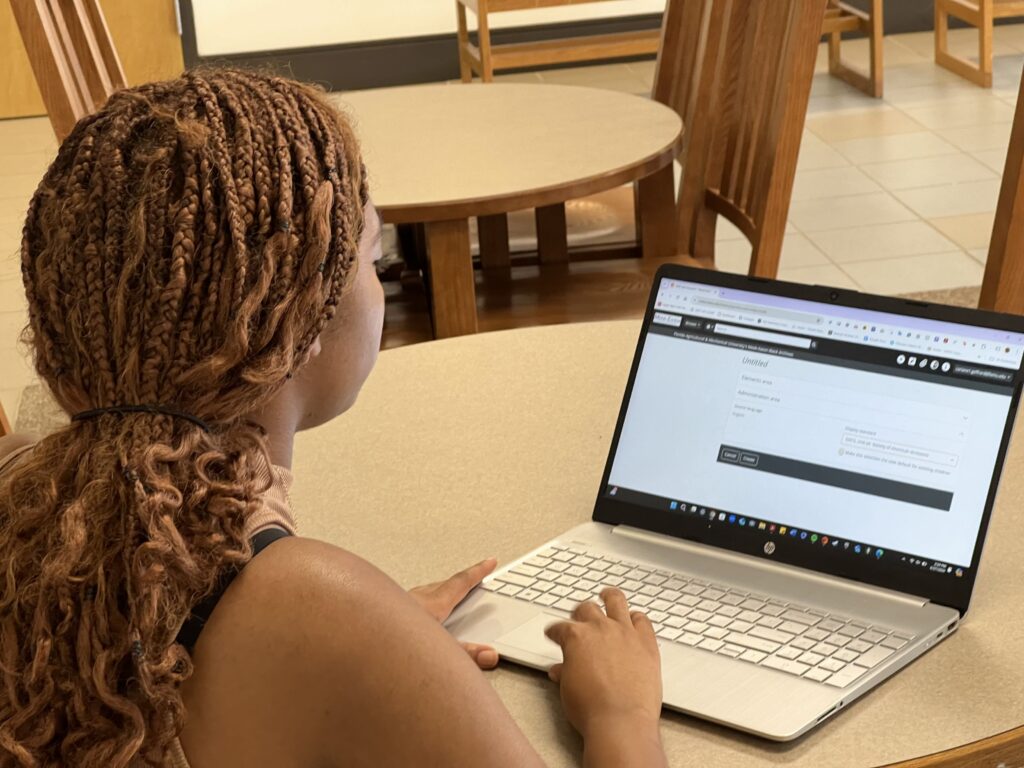
On July 1, Florida A&M University (FAMU) announced that the distinguished Meek-Eaton Southeastern Regional Black Archives Research Center and Museum (MEBA) is now on a global stage.
The Meek-Eaton Black Archives was a dream realized in the early 1970s with the legislative efforts of Florida’s first African American legislator since the Reconstruction era – and FAMU alumnus – Representative Joseph “Joe” Lang Kershaw, Sr.
Now, as the museum nears its 50th anniversary, there’s a push to expand its visibility.
Through Meek-Eaton’s collaboration with FAMU, the Smithsonian, the Institute of Museums and Library Services (IMLS) and the Mellon Foundation, two new platforms will be accessible through MEBA’s official website, www.famu.edu/meba. This will serve as a digital archive that makes MEBA’s expansive collection of African American history and culture available internationally.
Powered by Omeka open-source software, the “EXPLORE” portal allows users to dissect the museum’s vast collection of artifacts and exhibits at will. This section will feature collections with physical artifacts, with the homepage even highlighting a select “Featured Collection of the Month” that updates periodically. The “LEARN” portal, programmed by the open-source software AtoM (Access to Memory), will allow users to access digital files and find aids.
Dr. Reginald J. Perry, the associate provost for Academic and Faculty Affairs, believes the digital archive holds exponential research value for students and the public.
“I think it is a great idea. I had a chance to take an in-person tour of MEBA a few weeks ago. Although I passed by there often, I hadn’t been inside in several years. It is packed with so much history, and I’m sure the increased visibility from the website will lead some to come visit MEBA in person,” Perry said.
A digital database is not new to MEBA’s current director of museum operations, Timothy A. Barber. In Miami, Barber previously served as the director for the Black Archives History and Research Foundation of South Florida. But, it was his tenure as an archivist there that showed him the impact of a museum’s digital footprint.
“I remember the first database that I built back in 2009, and I was excited when someone from France sent me an email that said that they were researching the Chitlin Circuit and […] because we had that database, they were able to find our archives all in the way in France,” Barber said. “I’m looking for that to happen for the Black Archives here at Meek-Eaton so that […] the database will advertise what we have and open the door for people across the world to be able to explore, learn and connect with what we do.”
Meek-Eaton currently holds more than 500,000 individual archival records, but a small team manages this website. Incidentally, not all collections are available to view. Some are currently labeled as “closed to the public” or ‘in progress.” As the team works to populate the website, director Barber hopes that users will check in routinely to view new collections.
Autumn Heatrice is an MEBA employee working under a grant provided by Mellon. Her role is to help the museum retain intellectual control of its archival holdings; thus, she is also a part of the team that updates the website, focusing more on the “EXPLORE” portal.
“Without the help of grant-funded individuals, these websites would still be in process instead of in action. I think that this not only encourages funding, but it also entices newer individuals to want to be a part of this necessary groundwork, which will soon allow MEBA to become the shining gold mine of a resource that she is,” Heatrice said.
Director Barber echoes these sentiments.
“Meek-Eaton desires to help the university reach its R1 status strategic priority goal. This step-in digital access is only the beginning; the real work starts with finding the funding to help build the capacity at Meek-Eaton, which will provide the staff needed to populate the digital sites with the archival material daily,” Barber said in a prepared statement.
Despite this, Barber emphasizes that the physical records for these “in-progress” collections are still available at the museum. Researchers can request them online through the research and archival access forms.
The National Park Service (NPS) may have granted Barber’s wishes regarding funding. Under the Park Service’s Historic Preservation Fund, FAMU is receiving $749,997 to rehabilitate Carnegie Library, the building attached to the front of MEBA.
To dive into the Meek-Eaton Black Archives’ digital archive, visit www.famu.edu/meba. For further questions on this venture, contact Timothy Barber at timothy.barber@famu.edu, 850-599-3020, or visit MEBA at 445 Robert and Trudie Perkins Way. The museum is open Monday through Friday from 10 a.m. to 4 p.m.